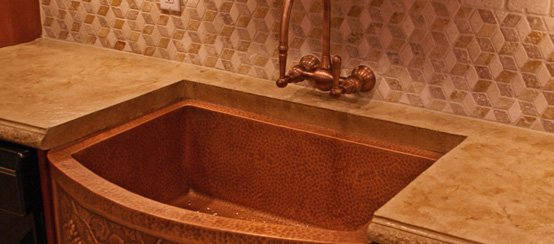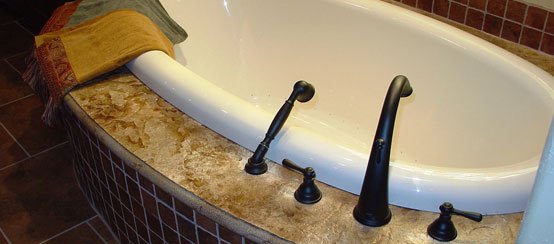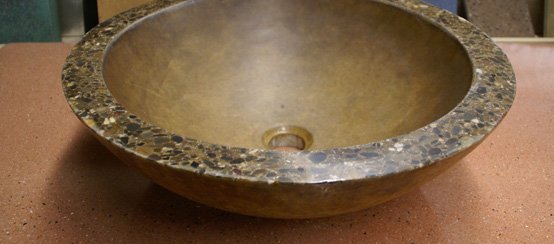|
|
|
|
|
|
|
|
|
|
|
|
|
|
|
|
|
|
|
|
|
|
|
|
|
|
|
|
|
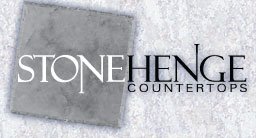 |
|
|
Stonehenge Countertops: Frequently Asked Questionsclick on the question to learn the answer.Why Would You Want a Concrete Countertop?
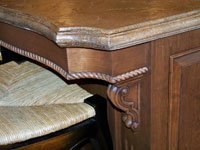 Forget that concrete countertops have become the darling of architects and designers. Your concrete top will become a unique expression of who you are. Other reasons you might select a concrete top include: Forget that concrete countertops have become the darling of architects and designers. Your concrete top will become a unique expression of who you are. Other reasons you might select a concrete top include:
What are the Advantages of Concrete Compared to Other Countertop Materials?
What are the Disadvantages of Concrete vs. Other Countertop Materials?

Are Concrete Countertops Sanitary?
Many people are surprised to learn that our concrete countertops are easier to keep clean than granite. We use a sealer that both penetrates and forms a protective surface film that creates a smooth surface. This surface is smoother than a typical granite countertop. Look closely at a granite surface and you can see some areas that are duller than the main surface resulting from natural voids, fissures, and pits. These low spots provide a potential hiding spot for contaminants like dirt and grease or food residue, thus providing a perfect environment for bacteria growth. Also, with granite, unless you have some geology background, you cannot be exactly sure of what you are getting. All granites and marbles vary in porosity. Some slabs arrive at the fabricators better polished than others. These differences are not apparent to the untrained eye, but beware.
Our tops are carefully finished and sealed so as to be virtually impervious to liquids and to prevent contaminants from penetrating the concrete.
How Much will my Concrete Countertop Cost?
Concrete is priced competitively with most countertop materials other than plastic laminate. Of course if price is your primary objective, bypass concrete. A better choice for a limited budget is one of the commodity level one granites sold as loss leader by a local big box store, but be careful of the extra items like installation that bump up the loss leader base price.
With template and installation, our typical tops range from $80 - $100+ per square foot, depending on finishes and features. We will work with you or your designer to provide an accurate estimate for your project, and with your guidance, we can suggest options to keep the top in your budget. Can I Use Concrete in the Bathroom?
Stonehenge makes concrete vanity tops and integrated sinks bathrooms and lavatories. We also fabricate custom tub surrounds and vertical shower panels.
In What Other Places in my Home Can I Use Concrete?
Besides kitchens and baths, concrete countertops are great for bars, hutches, fireplace surrounds, hearths, and outdoor kitchens.
Concrete can also be used in vertical applications such as backsplashes and shower walls.
How Big a Top Can You Make?
Our longest slab length for a standard countertop is about ten feet. For longer tops, or L-shaped tops, we locate seams at corners, or at sinks and cook tops based on structural considerations. We will always review seam options with you before fabrication to maximize aesthetics and functional strength. Our typical seam is one-sixteenth of an inch which is wider than those found on most granite tops. Remember that concrete countertops are hand processed and are not machine cut, so the seam tolerances need to be slightly wider. We minimize seam appearance with color-matched acrylic caulk.
Will my Cabinets Support a Concrete Countertop?
A square foot of 1 ½ thick concrete weighs approximately 18 lbs while the same square foot of 3 cm granite weighs in at 16.5 lbs. Any cabinet strong enough for a granite top will also handle one of our concrete countertops. There are conditions like large farm sinks or cantilevered slabs that may require some extra support. When we template, we will check to see that your cabinets are structurally sufficient to bear the weight of your new countertops. With our background in cabinets, we can offer good advice and fabrication options should any additional support be necessary.
What Colors are Available?
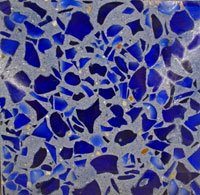 Concrete is available in a kaleidoscope of color! Beyond a wide selection of color, our tops can be produced in speckled or variegated patterns depending on the finishing technique used. For more on color, visit our showroom or look at the color selection pages of this website. Concrete is available in a kaleidoscope of color! Beyond a wide selection of color, our tops can be produced in speckled or variegated patterns depending on the finishing technique used. For more on color, visit our showroom or look at the color selection pages of this website.How Do Your Produce Custom Colors?
Stonehenge Countertops specializes in custom color development. We can even modify existing colors or match a specific paint color. If you have a wood sample or other item you would like the top to match or complement, bring it to our concrete studio and we can review possibilities. Please allow about three weeks for us to produce several samples for your approval.
How Much Color Variation can I Expect?
Concrete tops are natural, hand-crafted products. Factors such sand and cement lots will affect the appearance of the finished concrete. Moisture and temperature also vary from day to day and affect the curing of the finished product. Although our software calculates each mix design with precise formulas for exact weights of any required pigments, you may still see some color variation from batch to batch based on the variables at play.
We have also learned over time that people perceive colors differently based on sample sizes. For example, a 5 x 5" sample will appear different than a full top of the same color because the small sample cannot include all the natural randomly occurring variations found in a larger surface. While the color of a small sample may appear completely uniform, a whole countertop in that exact same color will have variations. These variations give concrete its character just like other natural materials including marble, soapstone, or granite. For those who prefer a very homogenous look, the better choice is one of the quartz products or a solid surface countertop. What Edge Designs are Available?
Proper edge design selection can take a concrete top from ordinary to spectacular. Rather than go with boring straight edges out of a standard form, we offer a wide range of possibilities see the Edge Designs section of this website. Options include rock face, Ogee, rope, coral reef, and bull nose. By using wood mouldings from our parent company in our forms, we can offer unlimited custom edges.
What Sinks can be used with Concrete Countertops?
Stonehenge Countertops specializes in fabricating integral concrete sinks in just about any size or shape. Some of our more imaginative designs can be found in concrete tops for bathrooms. We also cast country farm sinks for the kitchen in any size with a flat or curved front apron, and one or two bowls sized to your needs. Concrete is the perfect material to create a farmhouse sink with a classic sturdy look.
If you do not want an integrated concrete sink, our tops accept all other types of sinks including drop-in, vessel, under-mount, and farm style apron front. We can also prepare your top for a drop-in cooktop. Concrete vessel sinks have become a big hit for bathrooms. A concrete vessel sink can be placed on a matching or contrasting concrete top, or on another material like granite or marble. We maintain a large number of vessel sink moulds, and if one of these does not work for your application, we can fabricate a custom sized vessel sink to your specifications with our computerized mould making process. Can you Fabricate Concrete Backsplashes?
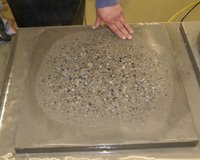 Backsplashes are cast and finished separately and deck mounted after the countertops are installed. Backsplashes are nominally 1 inch thick and can be from 3 inches high to full height. We precast any needed electric outlet openings.
Backsplashes are cast and finished separately and deck mounted after the countertops are installed. Backsplashes are nominally 1 inch thick and can be from 3 inches high to full height. We precast any needed electric outlet openings.Will I be Able to See Where Pieces are Seamed?
Fu Tung Cheng, a concrete countertop pioneer and author, sometimes uses seams as a design opportunity to emphasize through use of a non right angle line, a change of color, or set off with an inlaid object. A seam is part of the look of concrete countertops and when done properly, can enhance their special beauty.
If you are the type who prefers a seamless countertop surface, purchase a solid surface top like Corian over either granite or concrete. Concrete countertops are hand made and hand processed; unlike granite, they are cast, not machine cut, so tolerances for seams need to be more generous. We minimize seam appearance by using color-matched caulk. Will My Concrete Countertop Crack?
We incorporate structural reinforcement like rebar into all our countertops, and under normal conditions, they will not develop structural cracks. It is common, however, to find fine surface-based hairline cracks in any concrete top. These occurrences have no impact on the tops structural integrity, and hairline cracks are considered an inherent part of the product, not a fabrication defect. If you think you would be bothered by a hairline crack (smaller than ½ a millimeter), then you should select an alternative countertop material. We will be glad to show you what to expect when you come to our showroom.
Will My Concrete Countertop Stain?
Bare concrete is porous and stains easily. All concrete countertop fabricators use some type of sealer, but the effectiveness of the various products available varies significantly. Fu-Tung Cheng long recommended a penetrating sealer followed by a couple of wax top coats which he then suggested should be renewed monthly. His books carefully noted that tops prepared this way were only stain resistant.
In the past couple of years, concrete sealer technology has accelerated rapidly in response to demands from the exploding popularity of concrete countertops. We use the very best (and most expensive) high-performance sealer available today in order to deliver exceptionally durable products with excellent resistance to common food items like lemon juice, olive oil, and red wine. Will Heat Affect My Concrete Countertop?
Concrete can absorb considerable heat without damage (example: roads and sidewalks), but under severe heat exposure, concrete can form micro-cracks. Although boiling water will not damage your top, you should avoid direct contact with pots taken directly from the oven. The sealer we use is also highly heat resistant, but a maximum heat rating of 450°, there is a limit.
As with all other countertops materials, the use of a trivet for hot pots is prudent. We also offer metal trivet inserts that are embedded into the top in a strategic location to place pots on when taken out of a hot oven. When comparing granite tops to concrete tops, you will find no real differences in heat tolerance. Contrary to some claims, granite countertops are vulnerable to heat related damage. When exposed to high heat, the quartz crystals in some granites can expand and pop out. Repeated rapid heat expansion can lead to cracking of the slab itself. Finally, all granites should be sealed, and the sealers are vulnerable to heat damage. Solid surface countertops like Corian compare poorly vs. concrete countertops in heat resistance. All solid surface tops come with a warning to avoid exposure to heat because their thermal expansion coefficients make them very susceptible to cracking. Can I Cut My Concrete Top?
Like granite, concrete is a very hard material, and it is not advisable to cut directly on the surface. In addition to dulling your knife, regular cutting on a concrete top could damage the sealer and leave marks. Just as with granite or marble, we suggest the use of a cutting board.
Can My Top Be Repaired?
It is very unlikely for a concrete top to chip unless it is struck by a hammer or something very heavy is dropped on a corner. In the event of damage, we can patch the concrete so as to minimize the visibility of the repair.
Will My Top Scratch?
We selected our sealer for its hardness and resistance to common kitchen chemicals. The sealer can scratch, however, if sliced with a knife or if heavy or sharp objects are dragged across the surface. If you cut directly on the top, the integrity of the sealer could be compromised and could allow stains to penetrate into the base material. Cutting on any hard countertop surface will also ruin your knives, so always reach for the cutting board. If you accidentally damage the sealer of your countertop, it can be resurfaced.
What is the Difference Between Precast and Cast-In-Place Countertops?
 There are two primary ways to fabricate a concrete countertop; precast and cast-in-place. Stonehenge Countertops is experienced in both methods, and can offer guidance about which type of top might be best for you.
There are two primary ways to fabricate a concrete countertop; precast and cast-in-place. Stonehenge Countertops is experienced in both methods, and can offer guidance about which type of top might be best for you.All things being equal, we prefer to precast countertops in our shop, and then move to grinding, staining, and sealing. With these steps completed in the shop, we can then deliver and install a finished product with minimal disruption to you. Our shop also provides an ideal setting to control the fabrication variables so critical in producing a high quality concrete countertop. Most of our pre-cast tops are made with an inverted pour where the top side is faced down in the mould. A cast-in-place top is almost always poured with the face side up. You can save money with our pre-cast concrete countertops because we have shop equipment that could not be taken to a construction site. To get a smooth surface, we utilize a heavy duty 4 x 8 air lift vibrating station that consolidates the wet concrete and removes air at the same time. For large tops, we have an automated flipping station to invert the top back to its right side up position when we take it out of the mould. Once out of the mould, we can wet grind the tops with a built-in water containment system; in your house, managing water for grinding would be a different story. Diamond tool wet grinding is key process for concrete countertops with exposed aggregates like recycled glass and pea gravel, or with embedded objects. Your pre-cast top will arrive with a beautiful smoothly honed surface. We can also fabricate cast-in-place tops. This process involves making a mould in your home directly over the cabinets to be covered. The cast-in-place approach makes sense in situations where you have a very large island to cover or where you want a long countertop section without a seam. With our cast-in-place tops, there are two finishes available: a troweled surface or one pressed with a texture stamp. Coloring can be done with integral pigments or with water based stains. What is the Process for Buying a Concrete Countertop?
Good planning in advance on your part will expedite the process in the end. If you are involved in a planned remodeling project, we recommend that you visit us to select your top as early in the process as possible. Here are some key steps:
Do You Offer a Warranty?
Yes. Stonehenge Countertops warrants our tops for one year after installation. Of course concrete tops will outlast your cabinets, but any problem should manifest itself within the first year. Your top will be subjected to more stress while transporting it than you would ever exert after installation. We will provide you with an Owner's Guide and you can be confident that we will be here when you call. After 48 years in business, we are not going anywhere.
Whom Do I Call to Discuss a Project?
Contact the Royal Cabinet Company showroom at (908) 963-4115 or email us at concrete top@royalcabinet.com
|
|
|
|
|
|
|||||||
|
|
 |
||||||
|
|
|
|
|
|
|
|
|
|
|
|
|
|
|
|
|
|
|
HOME |
WHY CONCRETE? |
ABOUT US |
KITCHEN GALLERY |
BATH GALLERY |
OTHER SPACES GALLERY |
OUTDOOR GALLERY |
|||||||
